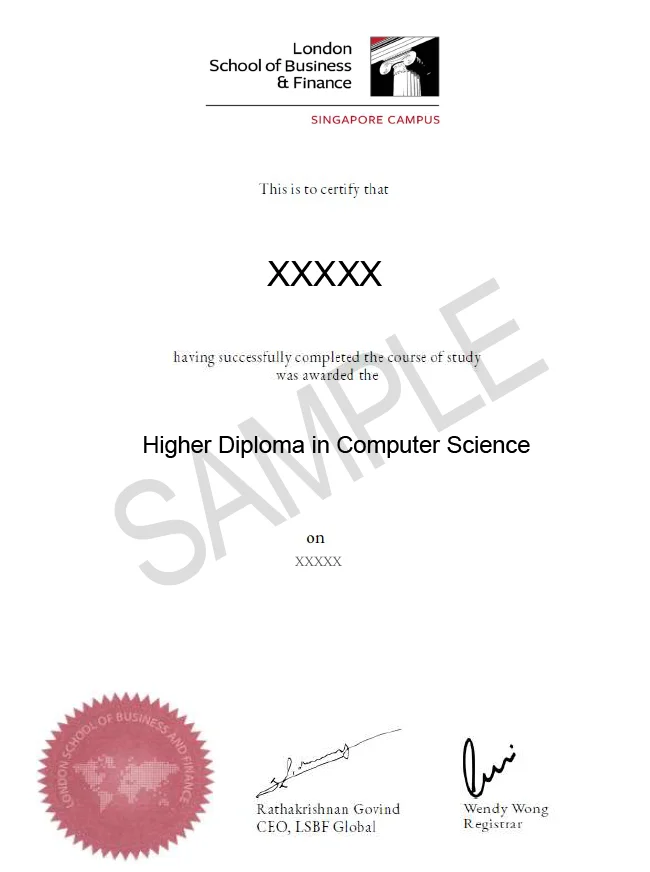The Higher Diploma in Computer Science builds upon the skills developed in the Diploma in Information Technology, providing students with a solid grounding in key computer science and IT areas. The programme prepares students for careers in IT and computer science across various industries, equipping them with technical expertise essential for roles that require hands-on knowledge and problem-solving abilities. Graduates will have the opportunity to progress to degree programmes at the University of East London, with potential advanced standing in select courses. The programme also encourages practical learning, with students expected to bring their own laptops for laboratory exercises.
This module develops the skills and techniques required for creating an overall plan for the design of software, design of functional specifications based on user and business requirements incorporating various controls, functionality, and interoperability of different elements into a designing an information system, modelling which describes the overall architecture in software, databases, hardware, and third-party frameworks that the software will use or interact with. It also covers some of the key legal, social, ethical, and professional issues relating to the information systems development.
This module introduces the basic concept of quantitative approaches to computing mathematics. This module will help students to attain essential knowledge in mathematical concepts and skills that are required for the study and application of computer science.
This module provides students with technical skills, communication skills, to develop applications by coding, testing, debugging, documenting, and reviewing in accordance with object-oriented programming standards for development and security. The module focuses on programming fundamentals such as introduction to computers and object-oriented programming, basic computation, variables, control structures, arrays, and the procedural programming methodology. It then progresses to introduce the object-oriented programming concepts of objects, classes, and inheritance.
This module focuses on fundamental computer architecture, network fundamentals, protocols, and models. This module introduces the categories of the network functions, evaluates, and justifies networks, and device performance using the OSI model and the most widely used TCP/IP protocol suite.
This module provides students with practical skills to examine, translate complex software ideas and concepts into a web application and establish key design principles and methodologies. Students can select and use appropriate tools and techniques with which to design, build, implement, and test a web application. This module also provides the opportunity to gain work skills to be able to provide professional documentation for the web pages produced.
This module provides students with a detailed and essential foundation in cloud computing. Cloud computing is the up and rising technology that will be considered critical in today’s business world. This introductory module to cloud computing describes and explains fundamental aspects of cloud computing concepts, models, technologies, and applications.
This module introduces students to the database which is fundamental to current business information system activities. A database typically provides features to enhance compactness, reliability, flexibility, and Internet applicability. Students will be introduced to the concepts and fundamentals of database systems. Students will be able to specify and create a database model, including the setting of various parameters that can be modified to suit different structured or unstructured data requirements, the design of data, as well as the development of mechanisms for maintenance, storage, and retrieval of data based on the business requirements. An open-source database tool is considered for verifying the features.
This module introduces students to and gives a clear understanding of how networks from in-home local area networks (LANs), to the massive and global Internet, are built and how they allow us to use computers to share information and communicate with one another.
This module introduces students to the vital role of information systems in supporting an organisation’s business processes and enhancing decision-making capabilities. The strategic implications of information systems will be analysed, and students will be introduced to decision-making processes, data analytics, risk management, and IT audit for managing an information system for an organisation.
This module introduces students to the fundamentals first approach which builds a strong foundation of advanced programming data structures, algorithms, concepts, and techniques. This module introduces students to programming in a problem-driven way that focuses on problem-solving rather than syntax, illustrating advanced data structure concepts by example, and provides hands-on practical laboratory exercises for students to gain programming and technical skills.
This module will focus not only on the Java programming language, but also the Java programming style and topics on advanced software design using Java and Java’s network programming. This course covers the techniques of object-oriented programming in Java and the characteristics of the Java programming language. The language features such as event-driven programming, GUI, Collection classes, packages, exception handling, and multithreading with concurrent programming are discussed. Java graphical user interface and animation tools are important parts of this course. Advanced topics such as network programming, threads, and sockets are introduced with an executable example.
This module introduces students to how to develop applications for Android smartphones and tablets. It demonstrates the need to know how to successfully develop your own Android applications. It also addresses all the fundamentals; including user interfaces, networking, SMS messaging, and databases. It is a practical module primarily for those who wish to extend their programming ability beyond and to deploy their own Android Apps themselves in the market.
This module provides an opportunity for students to undertake a task of a suitable size that allows him/her to apply the appropriate skills and knowledge learned in the Higher Diploma. It is normally expected that the project will involve, in addition to evidence of meeting targets in the area of self and time management, relevant background reading and research, and use of appropriate tools and techniques for design and development. Work produced here must be of professional competence suitable for the level of the Higher Diploma course. Students will undertake a significant piece of individual applied academic work in an area of their own interest relevant to, and demonstrating technical skills acquired in, their programme of study. Students will normally need to research one or more academic topic areas and then apply their findings to the construction and implementation of a computer-based system.
Local students shall possess one of the following:
International Students shall possess one of the following:
Both local and international students must fulfill the minimum English language entry requirement of one of the following:
18 years or older
Applicable for eligible Singaporean students, Permanent Residents (PR), Employment Pass (EP), Dependent Pass (DP), S Pass (SP), and Work Permit (WP) holders. T&CS apply. Enquire for more information.
NTUC members enjoy 50% unfunded course fee support for up to $500/year with conditions met. For more information, read here.

